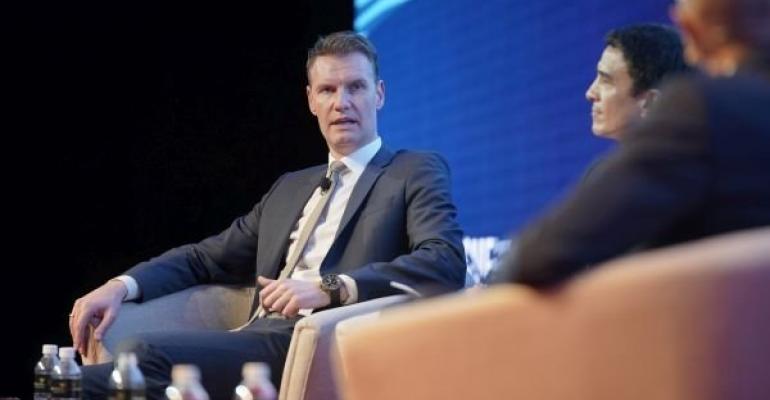Soren Toft, member of the executive board and coo of AP Moller Maersk, noted that digitalisation is set to change out the decades of old fashion and isolated operation in shipping.
Toft was one of panellists speaking at the Global Forum of the Sea Asia conference held in Singapore on Tuesday as part of the Singapore Maritime Week.
“Digitalisation has finally hit shipping and it will be for the long term. There will be more transparency, everything is going to become more public, and there will be a need to collaborate with others in completely different ways,” Toft said. “Digitalisation is a big short term change and a long term trend.”
Andreas Sohmen-Pao, chairman of BW Group and chairman of the Singapore Maritime Foundation (SMF), pointed out that digitalisation in shipping is not about the push to roll out revolutionary solutions such as fully autonomous ships.
“The reality of technology is that it is more incremental than suddenly seeing autonomous ships,” Sohmen-Pao said. The combination of various technological solutions such as virtual reality, blockchain, data management, control centre dashboards and so forth are the stuff that are being adopted at different stages by different companies according to their respective needs.
Toft added: “Things like the installation of sensors are part of the incremental change that we are doing. At Maersk, we are trying a number of things and sometimes they don’t work. We have tried digitalisation in the physical and documentation side. A lot of people don’t realise that ensuring the flow of documentation is sometimes more costly than physical transportation. Sometimes, documentation is an obstacle to reaching new markets.”
Seatrade Maritime News is reporting Live from Sea Asia 2019
Erck Rickmers, chairman of E.R. Capital, believed that technology will be the big driver of change and it will continue to be so in years to come.
“Shipping has been lagging behind, and one obstacle in particular is the high cost of satellite communications. But this is also increasingly being addressed and I see no reason why shipping won’t be as much fully digitalised as it should have been,” Rickmers said.
Tan Chong Meng, group ceo of PSA International, concurred that digitalisation in shipping is lagging behind compared to the consumerism and financial spaces. “But we are not expecting a revolution. Digital connectedness will be slow but it is getting there,” Tan said.
Tan said that what is important now amid the technology driven cycle is to stay focus on optimising assets, continue to create value and find new ways to do things.
Even without digitalisation, the shipping sector is already going through rapid changes in the Internet age and a much more globalised world. Tan recalled that just eight years ago, there were no large containerships. “Today we have more than we can cope with. Ports have to work very hard to keep up. We have to be aware of the needs of the society of the future, and then work backwards into our logistics both on land and for shipping,” he said.
Copyright © 2024. All rights reserved. Seatrade, a trading name of Informa Markets (UK) Limited. Add Seatrade Maritime News to your Google News feed.



